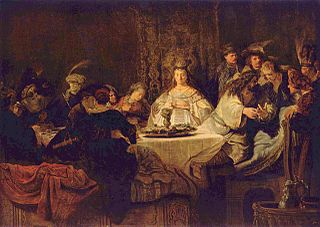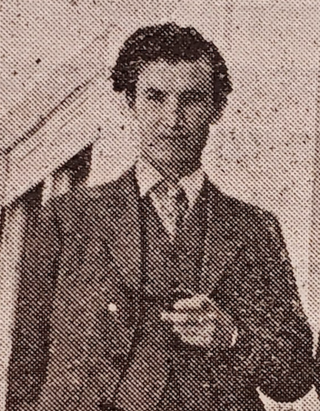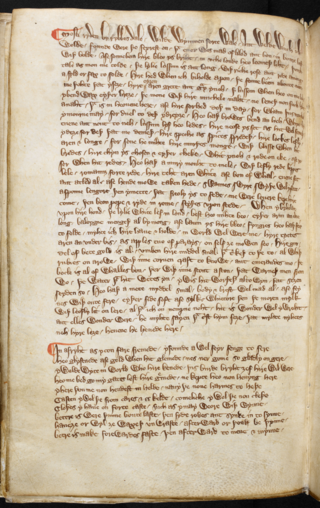
Orlando Gibbons was an English composer and keyboard player who was one of the last masters of the English Virginalist School and English Madrigal School. The best known member of a musical family dynasty, by the 1610s he was the leading composer and organist in England, with a career cut short by his sudden death in 1625. As a result, Gibbons's oeuvre was not as large as that of his contemporaries, like the elder William Byrd, but he made considerable contributions to many genres of his time. He is often seen as a transitional figure from the Renaissance to the Baroque periods.

A riddle is a statement, question or phrase having a double or veiled meaning, put forth as a puzzle to be solved. Riddles are of two types: enigmas, which are problems generally expressed in metaphorical or allegorical language that require ingenuity and careful thinking for their solution, and conundra, which are questions relying for their effects on punning in either the question or the answer.

"Sumer is icumen in" is the incipit of a medieval English round or rota of the mid-13th century; it is also known variously as the Summer Canon and the Cuckoo Song.

Ancrene Wisse is an anonymous monastic rule for anchoresses written in the early 13th century.
The Hengwrt Chaucer manuscript is an early-15th-century manuscript of the Canterbury Tales, held in the National Library of Wales, in Aberystwyth. It is an important source for Chaucer's text, and was possibly written by someone with access to an original authorial holograph, now lost.
Westron Wynde is an early 16th-century song whose tune was used as the basis of Masses by English composers John Taverner, Christopher Tye and John Sheppard. The tune first appears with words in a partbook of around 1530, catalogued by the British Library as Royal Appendix MS 58. Historians believe that the lyrics are a few hundred years older and the words are a fragment of medieval poetry.
"The Silver Swan" is the most famous madrigal by Orlando Gibbons. It is scored for 5 voices and presents the legend that swans are largely silent in life, and sing beautifully only just before their deaths.

Walid Khalidi is a Palestinian historian who has written extensively on the Palestinian exodus. He is a co-founder of the Institute for Palestine Studies, established in Beirut in December 1963 as an independent research and publishing center focusing on the Palestine problem and the Arab–Israeli conflict, and was its general secretary until 2016.
John Audelay was an English priest and poet from Haughmond Abbey, in Shropshire; one of the few English poets of the period whose name is known to us. Some of the first Christmas carols recorded in English appear among his works.

The Harley Lyrics is the usual name for a collection of lyrics in Middle English, Anglo Norman, and Latin found in Harley MS 2253, a manuscript dated ca. 1340 in the British Library's Harleian Collection. The lyrics contain "both religious and secular material, in prose and verse and in a wide variety of genres." The manuscript is written in three recognisable hands: scribe A, scribe B or the Ludlow scribe, and scribe C.

The Fifteen Signs before Doomsday is a list, popular in the Middle Ages because of millenarianism, of the events that are supposed to occur in the fortnight before the end of the world. It may find an origin in the apocryphal Apocalypse of Thomas and is found in many post-millennial manuscripts in Latin and in the vernacular. References to it occur in a great multitude and variety of literary works, and via the Cursor Mundi it may have found its way even into the early modern period, in the works of William Shakespeare.
The Proverbs of Hendyng is a poem from around the second half of the thirteenth century in which one Hendyng, son of Marcolf, utters a series of proverbial stanzas. It stands in a tradition of Middle-English proverbial poetry also attested by The Proverbs of Alfred; the two texts include some proverbs in common. The rhyme scheme is AABCCB.
Jane Chance, also known as Jane Chance Nitzsche, is an American scholar specializing in medieval English literature, gender studies, and J. R. R. Tolkien. She spent most of her career at Rice University, where since her retirement she has been the Andrew W. Mellon Distinguished Professor Emerita in English.
Foweles in the frith is a short, five-line Middle English poem. It is found in a manuscript from the thirteenth century containing mostly legal writings, and is accompanied by a musical score for two voices.
Carol Braun Pasternack was a professor of medieval English literature and language at the University of California, Santa Barbara (UCSB) from 1988 to 2013. She chaired the Medieval Studies department, and was also Dean of Summer Sessions at UCSB in 2011–2013.

"Alysoun" or "Alison", also known as "Bytuene Mersh ant Averil", is a late-13th or early-14th century poem in Middle English dealing with the themes of love and springtime through images familiar from other medieval poems. It forms part of the collection known as the Harley Lyrics, and exemplifies its best qualities. There may once have been music for this poem, but if so it no longer survives. "Alysoun" was included in The Oxford Book of English Verse, The Norton Anthology of English Literature, and The Longman Anthology of British Literature. It has been called one of the best lyrics in the language.
"The knight who could make cunts speak" is a French fabliau. Seven versions of it remain, including one in MS Harley 2253.
"Lenten ys come with love to toune", also known as "Spring", is an anonymous late-13th or early-14th century Middle English lyric poem which describes the burgeoning of nature as spring arrives, and contrasts it with the sexual frustration of the poet. It forms part of the collection known as the Harley Lyrics. Possibly the most famous of the Middle English lyrics, it has been called one of the best lyrics in the language, and "a lover's description of spring, richer and more fragrant in detail than any other of its period." No original music for this poem survives, but it has been set to music by Benjamin Britten, Alan Rawsthorne and others. It was included in The Oxford Book of English Verse.

"A wayle whyt ase whalles bon", also titled after the opening of its refrain "Ich wolde ich were a threstelcok", is an anonymous late-13th or early-14th century Middle English lyric poem. The text forms part of the collection known as the Harley Lyrics.

"Most I ryden by Rybbesdale", also titled "The Fair Maid of Ribblesdale", is an anonymous late-13th or early-14th century Middle English lyric poem. The text forms part of the collection known as the Harley Lyrics.









